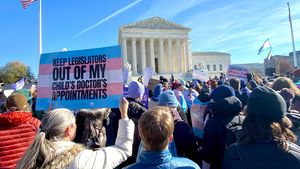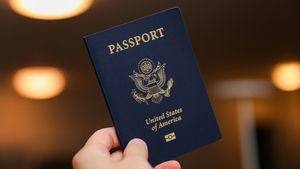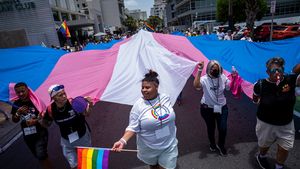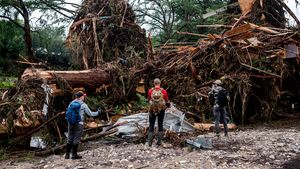Photo: Courtesy of Elliot Tiber. Above: Elliot Tiber (left) and Andre Ernotte in front of a New York theater showing their film High Street in the 1980s.
By 1983, it seemed like gay men in New York were dying in unprecedented numbers. My friend and lover, Andre Ernotte, and I were shocked as we started to hear that more and more friends of ours--men we knew from the clubs and colleagues in the arts community--were suddenly being hospitalized. The pain and suffering they endured was horrible; it seemed that death was their only reprieve. Just as things had started to get a little better for the gay community--just as we were beginning to gain some acceptance and have our rights acknowledged--this plague came and wiped out any sense of security we had. We realized that we and everyone we knew could very well get sick and die within a matter of weeks--even days.
The gay community quickly began to mobilize in order to increase awareness of this devastating disease and to search for a cure. None came. Then there were the hospital visits, and the funerals. It was all I could do to keep waking up every day--so many of our friends and colleagues were dying. There was Bobby, our favorite waiter at our favorite Italian restaurant. Wayne, who owned a hardware store in Chelsea, and his boyfriend Charlie, who was an accountant by day and an inspired jazz guitarist by night--they died within four months of each other. Angelo and David were Juilliard-trained dancers who tried one night back in 1981 to teach Andre and me how to tap-dance, with hilariously bad results. Angelo died from the illness on Christmas Eve 1984, and a broken-hearted David took a fatal overdose of sleeping pills the following Valentine's Day.
Not all of the men who died were from New York. Jackie had been born and raised in Texas during the Dust Bowl years. He had gone on to work as a stuntman on various Hollywood movies for two decades, before a back injury forced him to retire. Jackie had worked mostly in low-budget Westerns; his natural tan guaranteed him plentiful work as an "Indian." He was one of the most captivating men I had ever met. He brought to the East Coast some fairly wild stories about his time in Hollywood. He once told us how legendary Western movie star John Wayne called him into his trailer during the making of a film. When Jackie got there, Wayne chased him around his dressing room wearing only a towel knotted at the hip, all the while playfully shouting "Coo-chee coo-chee coo, yuh sweet-ass Injun!"
Jackie's lover Martin, a gifted poet and creative-writing teacher 20 years younger, got sick first. He was admitted to a hospital within a month of his first lesions, and dead from the disease less than three weeks after that. Jackie sat and held Martin's trembling hands during his final hours of suffering. When he was told by the head nurse that he was not entitled to be by Martin's side because he was not a family member, Jackie got up from the hospital room chair and headed for Texas, driving the taxi cab that still belonged to his employers. We never heard from Jackie again, but we did catch a rumor that he had been found dead at the wheel of his taxi after driving it into a ravine somewhere out in the lonely hills of Maryland. A fitting way for a stuntman to die.
Over the next two and a half years, we must have attended over 30 funerals--nearly one each month. In early August 1985, only a few weeks after America learned that Rock Hudson had AIDS, we went to another funeral. This time, we were paying our respects to a 21-year-old named Daniel, whom Andre had once directed in a play at Columbia University. Not one member of his entire family attended. It was the saddest funeral that Andre and I were to witness in those terrible years.
As we left the funeral home, one of the other mourners shared a story about how he and his friend were thrown out of a local bar by two drunk straight guys. They'd been told, "God is killing all you f****ts because it's what you deserve. You're all gonna die, you fuckin' queers! Go home and fuckin' die!"
This ugliness filled us with rage. Andre looked at the man with tears in his eyes, and said, "Who are they to judge us? Who are they to say we should die?" We all nodded our heads in agreement, but there was nothing left to say.
That night, after Andre passed out with our beloved Yorkie terrier Shayna sleeping next to him, I wrote down the name of the young man whose funeral we had attended that day. It was the 34th name on the list of people we knew who had died over the past two and a half years. I brought the list into the kitchen, and there I took a match and set fire to it. I dropped the flaming pieces of paper into the sink, and then slowly doused the burnt offerings with water from the faucet.
Excerpted from After Woodstock by Elliot Tiber (Square One, $25), SquareOnePublishers.com











































































